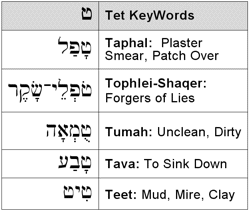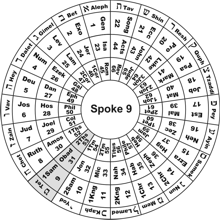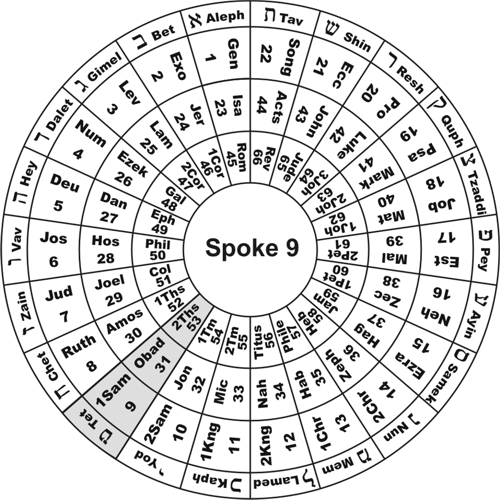The Ninth Commandment: No False Witness
The proud have forged (taphal) a lie (sheqer) against me: but I will keep
thy precepts with my whole heart.
Tet Verse of AV Psalm 119:69
 The integration of the Ten Commandments with the
first Ten Spokes is particularly lucid here on Spoke 9. The KeyWord taphal most literally means to smear, paste, or plaster.
From this, it became a natural metaphor of forging lies and slander, just as it is in the modern English idiom "smear campaign."
This is how God used it in the Tet verse of AV Psalm 119 above, where it appears in conjunction with the central
word of the Ninth Commandment – sheqer – which denotes lying, falsehood, and deception.
Job also used these words together when he accused his counselors of being "forgers of lies" (tophlei-shaqer, Job 13:4).
The Ninth Commandment will play an important role in understanding the elements of Spoke 9, most notably 2 Thessalonians on Cycle 3.
It relates to two other KeyWords God presented in the Alphabetic Verses: The integration of the Ten Commandments with the
first Ten Spokes is particularly lucid here on Spoke 9. The KeyWord taphal most literally means to smear, paste, or plaster.
From this, it became a natural metaphor of forging lies and slander, just as it is in the modern English idiom "smear campaign."
This is how God used it in the Tet verse of AV Psalm 119 above, where it appears in conjunction with the central
word of the Ninth Commandment – sheqer – which denotes lying, falsehood, and deception.
Job also used these words together when he accused his counselors of being "forgers of lies" (tophlei-shaqer, Job 13:4).
The Ninth Commandment will play an important role in understanding the elements of Spoke 9, most notably 2 Thessalonians on Cycle 3.
It relates to two other KeyWords God presented in the Alphabetic Verses:
- AV Lam 1:9 Her filthiness (tumah) is in her skirts; she remembereth not her last end; therefore she came down wonderfully: ...
- AV Lam 2:9 Her gates are sunk (tava) into the ground; he hath destroyed and broken her bars: her king and her princes are among the Gentiles: the law is no more; her prophets also find no vision from the LORD.
- AV Ps 9:15The heathen are sunk (tava) down in the pit that they made: in the net which they hid is their own foot taken.
Lies and slander are like mud or mire (teet) smeared on a good person. This KeyWord brings forth
the full force of the Letter Tet (as manifest in this fallen world filled with lies), since it is spelt Tet-Yod-Tet (טיט),
with Yod acting essentially as a vowel. David used this KeyWord metaphorically in conjunction with tava (sink) when he
cried to the Lord because of the slander smeared on him by wicked men:
For the zeal of thine house hath eaten me up; and the reproaches of them that reproached thee are fallen
upon me. When I wept, and chastened my soul with fasting, that was to my reproach. I made sackcloth also my garment;
and I became a proverb to them. They that sit in the gate speak against me; and I was the song of the drunkards.
But as for me, my prayer is unto thee, O LORD, in an acceptable time: O God, in the multitude of thy mercy hear me,
in the truth of thy salvation. Deliver me out of the mire (teet), and let me not sink (tava): let
me be delivered from them that hate me, and out of the deep waters. ... Hear me, O LORD; for thy lovingkindness is
good (tov): turn unto me according to the multitude of thy tender mercies. ...
Thou hast known my reproach, and my shame, and my dishonour: ...
Psalm 69:9ff
Words of slander flowed like a slurry of sludge from the mouths of these wicked men. They were not reproaching
David so much as the Good Lord Himself, just as they did when He came to earth in the Person of the Lord Jesus
Christ of whom this Psalm is a great prophecy. These KeyWords reveal the polarity inherent in every Letter. Its
primary meaning is based on the character of God – His Divine Goodness and Purity – which was obscured by the Fall initiated
by lies, deception, and disobedience to His Word. Like a magnet, Tet draws to itself the slimy mud of slander,
because wicked men will not abide the reproach that the Goodness of God, by its very nature, brings against
their sinful hearts and deeds.
Related article: 2 Thessalonians: Lying Wonders and Strong Delusion
|



